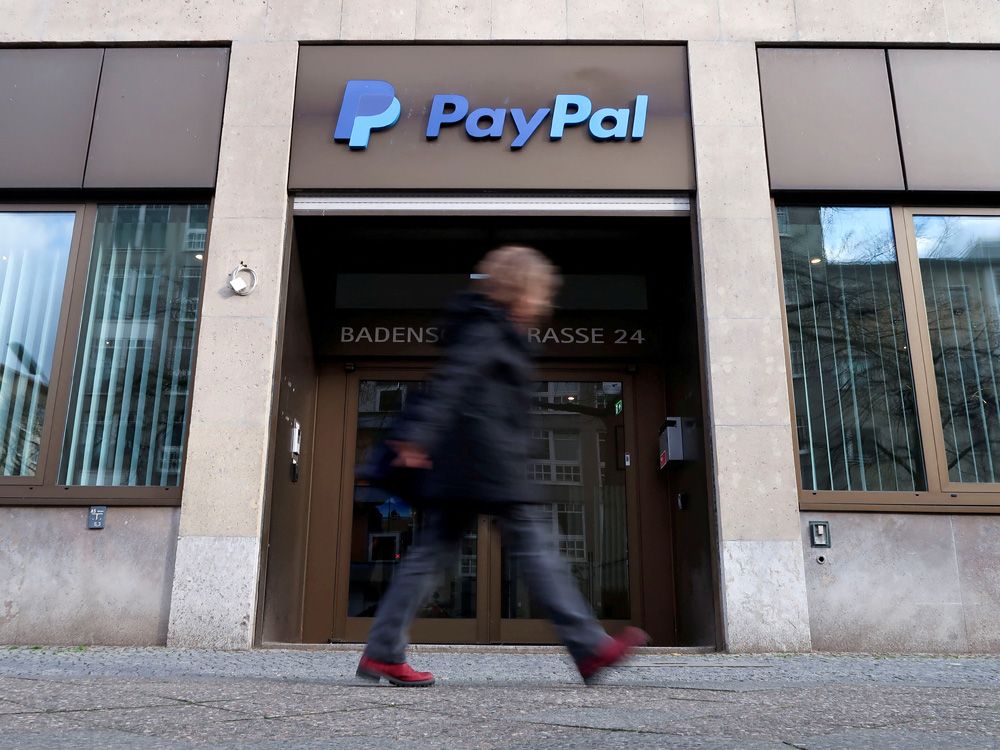Digital companies that boomed during lockdowns hit by fears they cannot withstand a recession
Author of the article:
Financial Times
Nicholas Megaw and Imani Moise in New York
A pedestrian walks past the PayPal logo at an office building in Berlin, Germany. Photo by REUTERS/Fabrizio Bensch/File Photo Almost half a trillion dollars has been wiped from the valuation of once high-flying financial technology companies that took advantage of the boom in initial public offerings earlier in the pandemic.
Advertisement 2 This advertisement has not loaded yet, but your article continues below.
More than 30 fintechs have listed in the United States since the start of 2020, according to CB Insights data, as investors flocked to companies they believed could benefit from a long-term shift toward digitization accelerated by the pandemic.
However, concerns about rising interest rates, lack of profits and untested business models as the economy heads towards a potential recession have put them at the sharp end of this year’s selloff.
Shares in recently listed fintechs have fallen an average of more than 50 per cent since the start of the year, according to a Financial Times analysis, compared with a 29 per cent drop in the Nasdaq Composite. Their cumulative market capitalization has fallen US$156 billion in 2022. If each stock is measured from its all-time high, around US$460 billion has been lost.
Advertisement 3 This advertisement has not loaded yet, but your article continues below.
A second-quarter update from online lender Upstart Holdings Inc. last week typified the challenges facing many fintechs. The company, which says it uses artificial intelligence to make consumer loan decisions, blamed the “tumultuous economy” for slowing down revenue growth and driving up losses.
This was exacerbated by comparison to an exceptionally strong result in the same quarter last year, when the contrast with economic lockdowns in 2020 led to annual revenue growth of more than 1,000 per cent.
The pressures have also hit more well-established companies such as PayPal Holdings Inc. and Block Inc. — formerly known as Square Inc. — which have shed almost US$300 billion in market cap between them this year.
Advertisement 4 This advertisement has not loaded yet, but your article continues below.
The decline in public-market valuations has filtered through to private companies. Klarna Bank AB slashed its price tag from US$46 billion to less than $7 billion in a private funding round earlier this month, and the Wall Street Journal reported this week that Stripe Inc. had cut its internal valuation by more than a quarter.
Dan Dolev, analyst at Mizuho Americas LLC, said fintechs — particularly digital payments firms — were “the first part of the tech sector to benefit greatly from COVID-19, because everyone was stuck at home and buying stuff online. Now they are overcorrecting to the downside ahead of other sectors, too.”
Dolev said he expected to see a rebound for many companies in the second half as year-on-year comparisons become more flattering.
Advertisement 5 This advertisement has not loaded yet, but your article continues below.
More On This Topic Fintechs face reckoning as easy money dries up Vass Bednar: Canadians want more competition in banking but regulators stand in the way ‘Toronto ecosystem is on fire’: Canadian tech shows resilience as storm clouds gather Some companies also face additional pressure from regulators. The U.S. Securities and Exchange Commission is reviewing perceived conflicts of interest created by “payment for order flow,” the main source of revenue for online broker Robinhood Markets Inc., and SEC chair Gary Gensler has called for clearer oversight of cryptocurrency markets. The U.S. Consumer Financial Protection Bureau also launched an inquiry into “buy now, pay later” firms last December.
Results from traditional financial services have been affected as well. Wells Fargo & Co. on Friday blamed a US$576-million writedown in its investment portfolio for missing analyst’s revenue expectations. Wells Fargo Strategic Capital was one of the largest investors in fintechs last year, according to CB Insights.
This advertisement has not loaded yet, but your article continues below.
Article content Despite the litany of challenges, many investors are still backing the sector. Cathie Wood’s ARK Fintech Innovation ETF, one of the most popular funds dedicated to the sector, has tumbled 62 per cent this year, but net outflows have been less than US$90 million, dwarfed by the US$2.7 billion in inflows over the previous two years. After a sharp decline earlier in the year, investors added a net US$31 million since the start of June.
Pedro Palandrani, director of research at Global X ETFs, which runs another fintech-focused ETF, said: “It’s likely that in the rest of 2022 we’re going to continue to see some of these companies face some pressures —rising rates are going to create challenges for companies on the lending side of things and (buy now pay later) in particular.”
However, he added that “despite the increased risks in the market, we’re only down about US$40 million in net outflows year to date … it really shows that investors continue to believe a lot in this sector over the long term.”
The Financial Times Ltd.
_____________________________________________________________
If you like this story, sign up for the FP Investor Newsletter.
_____________________________________________________________
Financial Post Top Stories Sign up to receive the daily top stories from the Financial Post, a division of Postmedia Network Inc.
By clicking on the sign up button you consent to receive the above newsletter from Postmedia Network Inc. You may unsubscribe any time by clicking on the unsubscribe link at the bottom of our emails. Postmedia Network Inc. | 365 Bloor Street East, Toronto, Ontario, M4W 3L4 | 416-383-2300
